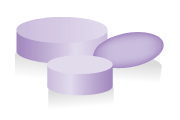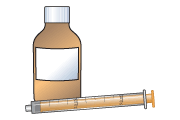Clonidine for Tourette’s syndrome, ADHD and sleep-onset disorder
This leaflet is for parents and carers about how to use this medicine in children. Our information may differ from that provided by the manufacturers, because their information usually relates to adults. Read this leaflet carefully. Keep it somewhere safe so that you can read it again.
Do not stop giving clonidine suddenly, as your child’s blood pressure may become dangerously high.
Name of medicine
Clonidine
Brand names: Catapres®
Many generic (unbranded) versions are also available.
This leaflet is about the use of clonidine for Tourette’s syndrome, attention-deficit hyperactivity disorder (often shortened to ADHD and sleep onset disorder (difficulty getting to sleep).
Why is it important for my child to take clonidine?
- For children with Tourette’s syndrome, clonidine will help to reduce the severity and frequency of tics.
- For children with ADHD, clonidine helps to reduce hyperactive symptoms.
- For children with sleep disorders and difficulty getting to sleep, clonidine will help them fall asleep.
What is clonidine available as?
Catapres® tablets: 100 micrograms; these contain gelatine and lactose
Generic (non-branded) tablets: 25 micrograms; these contain lactose
Liquid medicine can be ordered specially from your pharmacist
When should I give clonidine
For Tourette’s syndrome and ADHD, clonidine is usually given once a day to start with. This can be in the morning OR the evening.
Your doctor may then suggest that you give it two or three times a day, depending on how much your child needs.
Twice each day: this is once in the morning and once in the evening. Ideally, these times are 10–12 hours apart, for example some time between 7 am and 8 am, and between 7 pm and 8 pm.
Three times a day: this should be first thing in the morning, early afternoon (e.g. after school) and at bedtime. Ideally, these times are at least 4 hours apart.
For sleep disorders, clonidine is given once a day, about an hour before bedtime.
Give the medicine at about the same time(s) each day so that this becomes part of your child’s daily routine, which will help you to remember.
How much should I give?
Your doctor will work out the amount of clonidine (the dose) that is right for your child. The dose will be shown on the medicine label.
It is important that you follow your doctor’s instructions about how much to give.
How should I give clonidine?

Tablets
Tablets should be swallowed with a glass of water, milk or juice. Your child should not chew the tablets. You can crush the tablet and mix it with a small amount of soft food such as yogurt, honey or jam. Make sure your child swallows it all straight away.

Liquid medicine
Measure out the right amount using a medicine spoon or oral syringe. You can get these from your pharmacist. Do not use a kitchen teaspoon as it will not give the right amount.
When should the medicine start working?
The medicine should start to work within about 45 minutes of giving it.
What if my child is sick (vomits)?
- If your child is sick less than 30 minutes after having a dose of clonidine, give them the same dose again.
- If your child is sick more than 30 minutes after having a dose of clonidine, do not give them another dose. Wait until the next normal dose.
If your child is sick again, seek advice from your family doctor, nurse, pharmacist, or hospital. They will decide what to do based on your child’s condition and the specific medicine involved.
What if I forget to give it?
If you usually give it once a day in the morning
Give the missed dose when you remember during the day, as long as this is at least 12 hours before the next dose is due.
If you usually give it once a day in the evening
If you remember before bedtime, give the missed dose. If you remember after this, you do not need to wake your child up to give them the missed dose. If your child is taking clonidine for Tourette’s syndrome or ADHD, you can give the missed dose in the morning, as long as this is at least 12 hours before the next evening dose is due. If your child has clonidine for sleep disorders, you should NOT give the missed dose in the morning.
If you usually give it twice a day
If you remember up to 4 hours after you should have given a dose, give your child the missed dose. For example, if you usually give a dose at about 7 am, you can give the missed dose at any time up to 11 am. If you remember after that time, do not give the missed dose. Wait until the next normal dose.
If you usually give it three times a day
Do not give the missed dose. Give the next dose as normal.
Never give a double dose of clonidine. If you have missed more than one dose, contact your doctor for advice.
What if I give too much?
It may be dangerous to give too much clonidine, as it may make your child’s blood pressure very low (your child will feel dizzy and may faint). If you think you may have given your child too much, contact your doctor or local NHS services (details at end of leaflet) or take your child to hospital.
Take the medicine container or packet with you, even if it is empty. This will be useful to the doctor. Have the medicine package with you if you telephone for advice.
It can be dangerous to give too much clonidine. Never give your child more than the doctor has advised.
Are there any possible side effects?
We use medicines to make our children better, but sometimes they have other effects that we don’t want (side-effects).
- Your child may have a dry mouth, feel drowsy (sleepy) or dizzy.
- They may get constipation (difficulty doing a poo).
- Your child may feel sick (nausea) or be sick (vomit).
- Your child may get headaches and sometimes feel dizzy due to low blood pressure.
- Some children become agitated or restlessness at night.
These side-effects usually wear off as your child’s body gets used to the medicine. If they continue after a week or so, or are a problem, contact your doctor.
There may sometimes be other side effects that are not listed above. If you notice anything unusual and are concerned, contact your doctor. You can report any suspected side effects to a UK safety scheme at mhra.gov.uk/yellowcard
Can other medicines be given at the same time as clonidine?
- You can give your child medicines that contain paracetamol or ibuprofen, unless your doctor has told you not to.
clonidine should not be taken with some medicines that you get on prescription. It is important to tell your doctor and pharmacist about any other medicines your child is taking before starting clonidine.
Check with your doctor or pharmacist before giving any other medicines to your child. This includes herbal and complementary medicines.
Is there anything else I need to know about this medicine?
Do not stop giving clonidine to your child suddenly, as their blood pressure may become dangerously high.
- If you or your child wants to stop this medicine, discuss this with your doctor. They will explain how to reduce the dose bit by bit. Do not reduce the dose without discussing this with your doctor.
- Clonidine is also used to treat a range of other conditions, such as high blood pressure and pain.
General advice about medicines
- Try to give medicines at about the same times each day, to help you remember.
- Only give this medicine to your child. Never give it to anyone else, even if their condition appears to be the same, as this could do harm.
- Make sure that you always have enough medicine. Order a new prescription at least 2 weeks before you will run out.
- Make sure that the medicines you have at home have not reached the ‘use by’ date on the packaging. Give old medicines to your pharmacist to dispose of.
If you think someone else may have taken the medicine by accident, contact your doctor straight away.
Where should I keep this medicine?
- Keep the medicine in a cupboard, away from heat and direct sunlight.
- It does not need to be kept in the fridge.
- Make sure that children cannot see or reach the medicine.
- Keep the medicine in the container it came in.
Who to contact for more information?
Your doctor, pharmacist or nurse will be able to give you more information about clonidine and about other medicines used to treat Tourette’s syndrome, ADHD and sleep-onset disorder.
England: NHS 111
Tel 111
www.nhs.ukScotland: NHS 24
Tel 111
www.nhs24.scotNorthern Ireland: NI Direct
Wales: NHS 111 Wales
Tel 111
www.111.wales.nhs.ukADDISS (ADHD Information Services)
020 8952 2800
www.addiss.co.uk/Tourettes Action
0300 777 8427
https://www.tourettes-action.org.ukYoung Minds - parent helpine
0808 802 5544
www.youngminds.org.ukCopyright disclaimer
Version [2]. © NPPG, RCPCH and WellChild, all rights reserved. Review by March 2017.
The primary source for the information in this leaflet is the British National Formulary for Children. For details on any other sources used for this leaflet, please contact us through our website, www.medicinesforchildren.org.uk.
We take great care to make sure that the information in this leaflet is correct and up-to-date. However, medicines can be used in different ways for different patients. It is important that you ask the advice of your doctor or pharmacist if you are not sure about something. This leaflet is about the use of these medicines in the UK, and may not apply to other countries. The Royal College of Paediatrics and Child Health (RCPCH), the Neonatal and Paediatric Pharmacists Group (NPPG), WellChild and the contributors and editors cannot be held responsible for the accuracy of information, omissions of information, or any actions that may be taken as a consequence of reading this leaflet.
